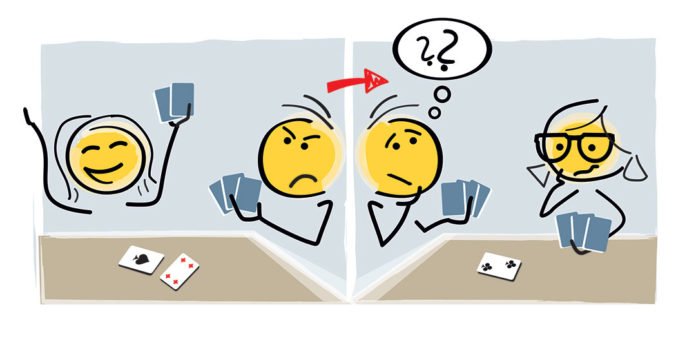The possibility that past cooperations can influence random future choices may appear glaringly evident: the outsider before you pays for your espresso, and afterward, you pay for the outsider behind you. You’ve had no collaboration with the last mentioned and no motivation to help them out, yet you do it in any case. Also, if a companion declines to help, you may be less disposed to help the following individual who approaches you for something.
These are the two examples of crosstalk—past connections influencing random future choices—and however this idea may appear to be normal, it had at no other time been joined into recreations of gatherings participating in rehashed social problems. Another ST Austria and their associates at Harvard, Yale, and Stanford have changed that and empowered the examination of the impacts of crosstalk between games.
The prisoner’s dilemma is an exemplary case of a social problem—that is, where the two individuals would be in an ideal situation on the off chance that they collaborated than if they both surrendered, yet there is still some motivation to abandon. At the point when social issues are rehashed, individuals grow (normally intuitively) a technique that manages when they ought to coordinate and when they should abandon.
Specialists utilize computer simulations to examine rehashed social difficulties or games by appointing virtual players with distinctive techniques and have built up which procedures prompt the advancement of participation, and how stable the subsequent agreeable circumstances are.
Effective techniques incorporate, for example, “tit-for-tat”(I begin by collaborating, and afterward, I’ll do whatever you did last) or “win-stay, lose-move” (I begin with participation, at that point, I’ll continue doing what I’m doing until the point that I lose).
In any case, in these past examinations, researchers have accepted that a player is just connecting with one other player (i.e., Bounce just ever plays Alice) or that a player’s choices in a single diversion are totally free of their choices in another amusement (i.e., Weave’s diversions with Alice have no impact on his amusements with Caroline). These suppositions don’t really apply to genuine social problems, be that as it may: people are frequently associated with numerous concurrent diversions, and communications with different players overflow into different amusements. As it were, these amusements are liable to crosstalk.
Presently, a group of specialists has built up another system to address this restriction in the hypothesis and take into consideration the quantitative assessment of the impacts of crosstalk on participation flow in a populace.
The group incorporates co-first creators Johannes Reiter, IST Austria graduate and current Stanford Instructor, and Christian Hilbe, a postdoc at IST Austria, and also Professors David Rand, Krishnendu Chatterjee, and Martin Nowak, of Yale, IST Austria, and Harvard, individually. Their different dexterities and viewpoints, including developmental flow, diversion hypothesis, brain research, and financial matters, all assumed a part of making the new model.
In a given recreation, each virtual player has a memory of the diversions played with each of the alternate players. In past models, a player would survey their past with their present adversary and choose a game plan in view of this past and their amusement methodology. In the new model, there is some shot that these recollections will be supplanted with the recollections relating to a third player. This strategy for encoding crosstalk is in reality general and records for all the numerous assortments of crosstalk, be it straightforward human blunder (blending individuals up) or showing preemptive kindness (you recollect your great experience) or some other sort. In addition, it can be connected to any societal system—from a gathering where everybody knows every other person to a hover to an arbitrary wreckage of associations.
For Christian Hilbe, this improvement was precisely what the structure required: “When displaying rehashed recreations, you generally have certain marvels that you need to depict. For me, it never felt just as past models were finished. When we presented crosstalk, it was as though everything snapped together—this is the model we ought to utilize.”
The human mistake has beforehand been considered in recreations of rehashed social quandaries. The distinction here is that while these blunders influenced just the rehashed amusement in which they happen, crosstalk causes expansive influences over the whole populace.
“When crosstalk is presented, all of a sudden you’re not playing against a solitary individual—you’re playing against everybody you are associated with, the entire society,” clarifies Krishnendu Chatterjee.
This outcome in agreeable and faulty conduct spreads significantly more effortlessly—even a solitary inadequate player can cause the entire breakdown of collaboration in a general public if alternate players are not adequately lenient.
Be that as it may, crosstalk likewise requires systems with the “right” level of absolution: excessively cruel, and you wind up with a general public where nobody coordinates; excessively liberal, and surrender can likewise spread as players figure out how to exploit different players. Crosstalk, in addition, prevents the advancement of participation: the creators actualized a transformative model and found that crosstalk diminishes the quantity of various beginning social orders that end up in stable, agreeable states.
Their paper, distributed today in Nature Communications, introduces an intriguing message for our present society. Johannes Reiter clarifies: “The nearness of crosstalk implies that players must be all the more sympathetic, particularly in a system that is exceedingly associated. A brutal technique for collaboration, for example, blow for blow, is especially sad in this condition.”
